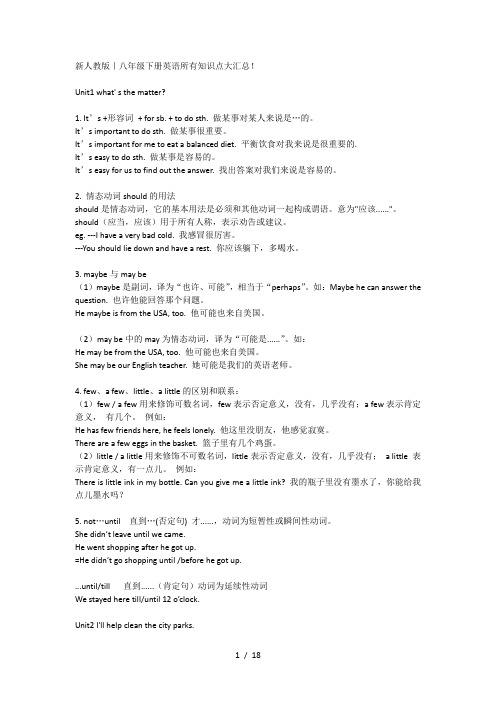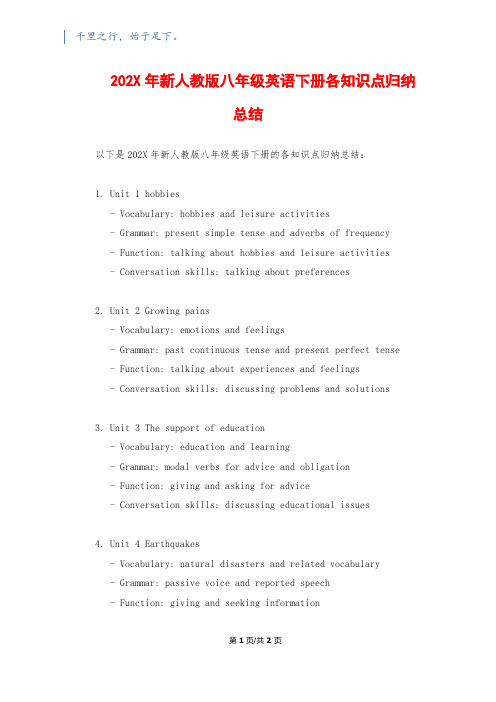新人教版八年级英语下册各知识点归纳总结
新人教版|八年级下册英语所有知识点大汇总

新人教版|八年级下册英语所有知识点大汇总!Unit1 what' s the matter?1. It’s +形容词+ for sb. + to do sth. 做某事对某人来说是…的。
It’s important to do sth. 做某事很重要。
It’s important for me to eat a balanced diet. 平衡饮食对我来说是很重要的.It’s easy to do sth. 做某事是容易的。
It’s easy for us to find out the answer. 找出答案对我们来说是容易的。
2. 情态动词should的用法should是情态动词,它的基本用法是必须和其他动词一起构成谓语。
意为"应该......"。
should(应当,应该)用于所有人称,表示劝告或建议。
eg. ---I have a very bad cold. 我感冒很厉害。
---You should lie down and have a rest. 你应该躺下,多喝水。
3. maybe与may be(1)maybe是副词,译为“也许、可能”,相当于“perhaps”。
如:Maybe he can answer the question. 也许他能回答那个问题。
He maybe is from the USA, too. 他可能也来自美国。
(2)may be中的may为情态动词,译为“可能是......”。
如:He may be from the USA, too. 他可能也来自美国。
She may be our English teacher. 她可能是我们的英语老师。
4. few、a few、little、a little的区别和联系:(1)few / a few用来修饰可数名词,few表示否定意义,没有,几乎没有;a few表示肯定意义,有几个。
例如:He has few friends here, he feels lonely. 他这里没朋友,他感觉寂寞。
202X年新人教版八年级英语下册各知识点归纳总结

千里之行,始于足下。
202X年新人教版八年级英语下册各知识点归纳总结以下是202X年新人教版八年级英语下册的各知识点归纳总结:1. Unit 1 hobbies- Vocabulary: hobbies and leisure activities- Grammar: present simple tense and adverbs of frequency- Function: talking about hobbies and leisure activities- Conversation skills: talking about preferences2. Unit 2 Growing pains- Vocabulary: emotions and feelings- Grammar: past continuous tense and present perfect tense - Function: talking about experiences and feelings- Conversation skills: discussing problems and solutions3. Unit 3 The support of education- Vocabulary: education and learning- Grammar: modal verbs for advice and obligation- Function: giving and asking for advice- Conversation skills: discussing educational issues4. Unit 4 Earthquakes- Vocabulary: natural disasters and related vocabulary- Grammar: passive voice and reported speech- Function: giving and seeking information第1页/共2页锲而不舍,金石可镂。
八年级下册人教版英语笔记

八年级下册人教版英语笔记一、Unit 1 What's the matter?1. 重点单词。
- matter:n. 问题;事情。
常用搭配:What's the matter (with sb.)? = What's wrong (with sb.)? = What's the trouble (with sb.)?(某人)怎么了?- sore:adj. 疼痛的;酸痛的。
例如:a sore throat喉咙痛。
- stomachache:n. 胃痛;腹痛。
- foot:n. 脚;足。
复数形式是feet。
- neck:n. 脖子;颈部。
- fever:n. 发烧。
have a fever发烧。
- lie:v. (lay - lain)躺;平躺。
lie down躺下。
- rest:v. & n. 放松;休息。
take breaks/take a break = have a rest休息。
- cough:v. & n. 咳嗽。
have a cough咳嗽。
- toothache:n. 牙痛。
2. 重点短语。
- have a cold:感冒。
- have a stomachache:胃痛。
- lie down and rest:躺下休息。
- drink some hot tea with honey:喝些加蜂蜜的热茶。
- see a dentist:看牙医。
- get an X - ray:拍X光片。
- take one's temperature:量体温。
3. 重点句型。
- What should I do? 我应该做什么?- You should see a dentist and get an X - ray. 你应该去看牙医并拍X光片。
- Should I put some medicine on it? 我应该在上面敷些药吗?- Yes, you should. / No, you shouldn't. 是的,你应该。
最全面人教版八年级下册英语第一单元知识点归纳总结

Unit 1 What's the matter?一、词汇与短语◆重点单词A部分1.matter n. 问题;事情2.sore adj. 疼痛的;酸痛的3.stomachache n. 胃痛;腹痛4.foot n. 脚;足5.neck n. 颈;脖子6.stomach n. 胃;腹部7.throat n. 咽喉;喉咙8.hurt v. (使)疼痛;受伤9.fever n. 发烧10.passenger n. 乘客;旅客11.lie v. 躺;平躺12.break n. 间歇;休息13.rest v. &n. 放松;休息14.onto prep. 向;朝15.X-ray n. X射线;X光16.trouble n. 问题;苦恼17.toothache n. 牙痛18.hit n. (用手或器具)击;打19.headache n. 头痛20.herself pron. (she的反身代词)她自己21.off adv. & prep. 离开(某处);不工作;从……去掉B部分1.bandage n. 绷带v. 用绷带包扎2.press v. 压;挤;按3.sick adj. 生病的;有病的4.knee n. 膝;膝盖5.breathe v. 呼吸6.knife n. 刀7.sunburned adj. 晒伤的8.blood n. 血9.ourselves pron. (we反身代词)我们自己10.mean v. 意思是;打算11.climber n. 登山者;攀登者12.importance n. 重要性;重要13.risk n.&v. 危险;风险;冒险14.decision n. 决定;抉择15.accident n.(交通)事故;意外遭遇16.control v.&n. 限制;约束;管理17.situation n. 情况;状况18.spirit n. 勇气;意志19.kilo( = kilogram) n. 千克;公斤20.death n. 死;死亡21.rock n. 岩石22.nurse n. 护士◆重点短语A部分1.have a cold 感冒2.lie down 躺下3.have a stomachache 胃痛4.take one's temperature 量体温5.have a fever 发烧6.to one's surprise 使……惊讶的是7.get off 下车8.right away 立即;马上9.take breaks (take a break) 休息10.talk too much 说得太多11.drink enough water 喝足够的水12.have a very sore throat 嗓子非常疼13.get an X-ray 拍X光片14.see a dentist 看牙医15.drink some hot tea with honey 喝一些加蜂蜜的热茶16.put some medicine on sth.在……上面敷一些药17.feel very hot 感到很热18.sound like 听起来像19.all weekend 整个周末20.in the same way 以同样的方式21.go to a doctor 看医生22.go along 沿着……走23.on the side of the road 在马路边24.shout for help 大声呼救25.without thinking twice 没有多想26.have a heart problem 有心脏病27.thanks to 多亏了;由于28.in time 及时29.save a life 挽救生命30.get into trouble 陷入麻烦31.hurt oneself 受伤32.fall down落下;摔倒B部分1.be used to 习惯于……;适应于……2.in a difficult situation 在困境中3.take risks (take a risk) 冒险4.keep on doing sth. 继续(或坚持)做某事5.run out (of) 用尽;耗尽6.make a decision 作出决定7.cut off 切除8.get hit on the head 撞到头部9.get out of 离开;从……岀来10.be interested in 对……感兴趣11.give up 放弃12.mean doing sth. 意味着做某事13.put a bandage on sth. 用绷带包扎…14.lose one's life 失去生命15.feel sick 感到恶心16.mountain climbing 登山运动17.have problems breathing 呼吸困难18.be in control of 掌管;管理◆重点句子A部分1.What's the matter with you?=What's the trouble with you?=What's wrong with you?你怎么了?2.What should she do? 她该怎么办呢?3.Did you fall down? 你跌倒了吗?4.Should I take my temperature? 我应该量一下体温吗?5.I think I sat in the same way for too long without moving.我想我以同样的姿势一动不动地坐得太久了。
最新人教版八年级英语下册第一单元知识点汇总

最新人教版八年级英语下册第一单元知识点汇总Unit 1 What’s the matter?一、基础知识1.我感冒了。
可以表达为I had a cold、catch a cold或have the flu。
have a fever表示发烧,have a cough表示咳嗽,have a stomachache或肚子疼表示胃疼,have a toothache表示牙疼,have a headache表示头疼。
2.将身体部位和ache(疼痛)结合起来构成新的复合词,如stomach+ache=stomachache,head+ache=headache,tooth+ache=toothache,back+ache=backache,表示相应的疼痛。
3.“怎么啦?出什么事情了?”可以表达为What’ s the matter。
也可以用What’ s the trouble with you?或What’ s wrong with you。
matter和trouble为名词,其前可加the或形容词性物主代词,而wrong是形容词不能加the。
用于询问某人有什么病或遇到什么麻烦、问题,其后跟询问对象时,与介词with连用,如What’s the matter with sb。
= What’s your trouble?= What’s up?= What happens to sb。
举例来说,当问到“What’s the matter with you?”时,回答可以是“I have a bad cold.”4.maybe表示“或许”,常用于句首,表示可能性,后加句子。
例如Maybe you are right。
may be是情态动词+be的结构,意为“可能,也许”,后加名词、代词或形容词。
例如He maybe angry。
sound like可以和名词、代词以及从句结合使用,如It sounds like you don’t know the truth.It sounds like a good idea。
英语八下人教版重点语法

英语八下人教版重点语法
英语八下人教版的重点语法包括:
1.过去完成时(Past Perfect Tense):用来表示在过去某个时间或动作之前已经发生或完成的动作。
例如:I had already
finished my homework before my mom came back.
2.时间状语从句(Time clauses):用来表示时间关系的从句,一般以when,as soon as,until,before,after等引导。
例如:We will go to the park when it stops raining.
3.条件状语从句(Conditional clauses):用来表示假设条件的从句,一般以if引导。
例如:If it rains tomorrow, we will stay at home.
4.动词不定式(Infinitives):用来表示目的、原因、建议等。
例如:I went to the store to buy some groceries.
5.被动语态(Passive voice):用来强调动作的承受者而不是执行者。
例如:The cake was made by my mom.
6.定语从句(Relative clauses):用来修饰名词或代词的从句,一般由关系代词who,which,that引导。
例如:The boy who won
the competition is my neighbor.
这些语法结构在英语八下人教版教材中经常出现,需要学生掌握
和应用。
希望以上回答能对您有帮助。
人教版八年级英语下册各知识点归纳总结

人教版八年级英语下册各知识点归纳总结Knowledge Summary of People's Education Edition Eighth Grade English TextbookUnit 1 Dream JobsIn this unit, students learn about different occupations and career paths. They practice talking about their dream jobs and discussing the pros and cons of different professions. Vocabulary includes words related to jobs, such as lawyer, engineer, chef, etc. Grammar points include the present simple tense for expressing routines and habits, as well as future forms for talking about future plans.Unit 2 Healthy EatingThis unit focuses on the importance of a balanced diet and healthy eating habits. Students learn about different food groups, nutrients, and the benefits of eating a variety of foods. Vocabulary includes words related to food, such as carbohydrates, proteins, vitamins, etc. Grammar points include using countable and uncountable nouns, as well as quantifiers such as some, any, much, and many.Unit 3 Travel PlansIn this unit, students learn how to talk about their travel plans and experiences. They practice using travel vocabulary and expressions, as well as giving recommendations for places to visit. Vocabulary includes words related to travel, such as destination, itinerary, accommodation, etc. Grammar points include present perfect tense for talking about past experiences and future forms for making predictions and plans.Unit 4 Environmental ProtectionThis unit focuses on the importance of protecting the environment and taking action to preserve natural resources. Students learn about environmental issues and discuss ways to reduce waste and pollution. Vocabulary includes words related to the environment, such as recycling, renewable energy, pollution, etc. Grammar points include modals of obligation and necessity for giving advice and making suggestions.Unit 5 Festivals around the WorldIn this unit, students learn about different festivals and celebrations from around the world. They practice talking about cultural traditions, customs, and rituals. Vocabulary includes words related to festivals, such as celebrations, traditions, customs, etc. Grammar points include using the present perfecttense to talk about past experiences and cultural differences in expressing gratitude and apologies.Overall, the eighth grade English textbook covers a wide range of topics and language skills, including vocabulary, grammar, speaking, listening, reading, and writing. Students are exposed to a variety of real-life situations and authentic materials to help them develop their language proficiency and communication skills. By the end of the school year, students should feel more confident and competent in using English in different contexts and situations.。
(完整版)最新人教版八年级下册英语全册知识点大全

最新人教版八年级下册英语全册知识点大全Unit 1重点短语:have a stomachache have a cold lie downtake one’s temperature have a fever go to a doctorto one’s surprise agree to (do sth.)get into troublebe used to take risks run out (of)cut off get out of be in control ofkeep on ( doing sth.)give up语言知识归纳:1. What’s the matter (w ith you)?此句用来询问别人的病情。
类似的句子还有:What’s wrong with you?/ What’s the trouble?matter作动词用,意为“要紧”“有关系”,主要用于疑问句和否定句。
What does it matter? It doesn’t matter.【例题】Does it ________ if we can’t finish it today?A. mindB. mindsC. matterD. matters2. I have a sore throat.have “患病”,常用“have a /an+ 名词”.have a cold have a fever have a sore backhave a stomachache have a cough【例题】( )---Does he often have ______ cold? ---Yes. He also _____a cough and a sore throat.A. a; hasB. /; hasC. a; haveD. /; have3.Lie down and rest! 躺下休息lie down 躺下4.That’s probably why. 那可能就是原因。
- 1、下载文档前请自行甄别文档内容的完整性,平台不提供额外的编辑、内容补充、找答案等附加服务。
- 2、"仅部分预览"的文档,不可在线预览部分如存在完整性等问题,可反馈申请退款(可完整预览的文档不适用该条件!)。
- 3、如文档侵犯您的权益,请联系客服反馈,我们会尽快为您处理(人工客服工作时间:9:00-18:30)。
新人教版八年级英语下册各知识点归纳总结Unti1 what’s the matter?短语归纳1.too much 太多2.lie down 躺下3.get an X-ray 做个X光检查4.take one ’s temperature 量体温5.put some medicine on ......在....上敷药6.have a fever 发烧7.take breaks /take a break 休息8.without thinking twice 没多想9.get off 下车10.take sb to the hospital 送某人去医院11.wait for等待12.to one’s surprise 使.......惊讶的thanks to多亏于;由于14.in time及时15.think about 考虑16.have a heart problem患有心脏病17.get into the trouble 遇到麻烦18.do the right thing做正确的事情事情19.fall down 摔倒20.put ...... on sth把...放在某物上21.get hit/sunburned 摔伤/烧伤22.be interested in 对.....感兴趣23.be used to 习惯于.... 24.take risks/take a risk 挑战25.lose one’s life 失去生命26.because of 因为27.run out of 用完28.cut off 切除29.get out of 从...出来30.make a decision/decisions 做决定31.be in control of 掌管;管理32.give up 放弃用法归纳1.need to do sth .需要去做某事2.see sb doing sth 看见某人正在做某事3.ask sb sth 询问某人某事4.expect sb to do sth 期望某人做某事5.agree to do sth 想要做某事6.help sb (to) do sth 帮助某人做某事7.want to do sth 想要做某事8.tell sb to do sth 告诉某人做某事9.have problems(in) doing sth 做某事有困难e sth to do sth用某物去做某事11.be/get used to doing sth 习惯于做某事12.seem to do sth 好像做某事13.keep on doing sth 继续做某事14.mind doing sth 介意做某事语法点1.询问某人的健康问题及遇到麻烦的表达方法2.情态动词should的用法情态动词should的用法表示劝告与建议,也表义务与责任第一人称问句中,征询建议要记清3.不定代词的用法相关阅读方法推理判断阅读法精细解读1. What’s the matter (with you)? 怎么了?出什么事了?What’s the trouble/ the problem / wrong with sb./ sth.?2. I had a cold.我感冒了。
have a cold=catch a cold=have the flu have a fever have a cough咳嗽have a stomachache胃疼,肚子疼have a toothache牙疼have a headache头疼3. 身体部位+ache(疼痛)构成新的复合词stomach+ache=stomachache head+ache=headache tooth+ache=toothacheback+ache=backache后背痛4. much too+ 词,意为,too much+ 词,意为。
5. enough【形容、副词】足够的/地,enough放在名前后,形副后。
good enough足够好,enough money=money money6. lie down躺下,lie 躺,躺着,过去式lay;lie说谎,过去式lied7. maybe “或许”,常用于句首,表示可能性,后加句子。
Maybe you are right.may be,是情态动词+be的结构,意为“可能,也许”,后加名词、代词或形容词。
He may be angry.8. sound like+名词代词和从句:It sounds like you don’t k now the truth. It sounds like a good idea.sound+形容词,“听起来,好像”,The music sounds nice.9. need 需要,实义动词need+名词,需要某物;need to do sth.需要做某事,主语通常是人,表示人主动的动作:You need to listen carefully during class.need doing sth.主语通常是物,表示被动的动作:Your dirty clothes need washing.10. get off (the bus) 下(公交车)get on 上车11. agree 同意,赞同;同意做某事,同意某人的看法、观点。
12. trouble问题,麻烦;be in trouble ,maketrouble ,have trouble (in) doing sth. =have difficulties (in) doingsth 。
13. right away=right now=at once,意为。
14.【复习】advice [不可数名词]劝告,建议,向…征求意见,give sb. advice on sth.就某事给某人建议;advise [动词] advise sb. to do sth.advise sb. doing sth .15. 【复习】exercise 动词意为,可数时意为,不可数时意为。
16. hurt 及物动词,使……疼痛,……受伤,He hurt his leg while exercising.不及物动词,……(部位)疼。
His leg hurt badly.17. clean 【动词】,clean the classroom ,【形容词】,cleaner意为。
18. hit (用手或器具)打;击打The boy hit the dog with a stone.hit sb. on the head/ nose/ back打某人的头、鼻子、后背,on用在所打较硬的部位;hit sb. in the face/ eye/ stomach 打某人的脸、眼睛、肚子,in用在所打较软的部位。
19. be used to sth./ doing sth.习惯于、适应了……、做某事,强调状态;His grandpa was used to country life.Mary is not used to getting up early in the morning.get/ become used to sth./ doing sth. “变得习惯,逐渐适应……”强调过程、动作:It’s difficult for one to get used to another country’s habit.20. 【复习】free [形容词]空闲的free time;免费的the drink is for free;自由的I want to become a free bird.free【动词】使……解脱,得到自由He could not free his arm.21. run out用完,用尽When his water run out, he knew that he would have to do something to save his own life.物sth. tun out. 某物用尽了。
人sb. run out of物sth..人用尽了某物。
He run out of all his money last night.22. risk (sb.) to do sth. 冒险去做某事take a risk=take risks 冒险23. the importance of (doing) sth.(做)某事的重要性We students should know the importance of (learning) English.importance n. 重要(性),important adj.重要的,unimportant adj.24. decision 【名词】决定;抉择;make a decision make a decision to dosth.= 。
25. be in the control of …掌管,管理The headmaster is in the control of this new school.be out of control无法控制,无法管理be under control被控制住,在控制之中26. 【复习】mind意为,mind doing sth. , Would you mind my opening the window?27. give up (doing) sth. 放弃(做)某事,give up (playing) computer games;give up后可接名词、代词和动词ing形式,也可不接,如Never give up easily.二、重要短语1. have a cold2. have a stomachache3. see sb. do sth.4. shout for help5. expect (sb.) to do sth.6. to one’s surprise7. thanks to …8. think about…9. be interested in sth.10. lose one’s life11. save one’s life12. take a risk=take risks13. cut off14. keep on doing sth三、重点语法【反身代词】英语中共有八个反身代词,在使用时应注意和它所指的相应的对象在人称、性别、数上保持一致。
【用法】1. 可用作宾语,指的是宾语和主语表示同一个或同一些的人或事物。
如:Maria bought herself a scarf. We must look after ourselves very well.2. 可用作表语,指的是表语和主语表示同一个或同一些人或事物。
